
Choosing the Right Truck Hitch: Your Ultimate Guide
Picking the perfect hitch for your truck is about safety, performance, and making sure you can tow what you need. Let's break it down so you can make the best choice for your truck.
Key Points for Choosing a Truck Hitch
- Safety and performance are top priorities
- Match the hitch to your specific towing needs
- Three main hitch types: receiver, 5th wheel, and gooseneck
- Receiver hitches are most common and versatile
- 5th wheel hitches are for heavy-duty towing of large RVs and trailers
- Gooseneck hitches use a ball in the truck bed for serious towing
- Consider where the hitch will be installed on your truck
- Understand your truck's towing capacity and GVWR
- Choose the appropriate hitch class based on weight requirements
- Factor in tongue weight for proper weight distribution
- Consider additional features like sway control for safer towing
Types of Truck Hitches
There are three main types of hitches you'll come across: receiver hitches, 5th wheel hitches, and gooseneck hitches. Each has its own strengths and is best for different towing jobs.
Receiver hitches are the most common. They bolt to your truck's frame and have a square opening where you can insert different hitch accessories. These are great for towing smaller trailers, boats, or cargo carriers. Receiver hitches are versatile and can be used with a variety of attachments, making them a popular choice for many truck owners.

5th wheel hitches are heavy-duty options that sit in your truck bed. They're perfect for towing large RVs or big trailers. These hitches provide excellent stability and weight distribution, making them ideal for long-distance towing of heavy loads. The unique design of 5th wheel hitches allows for tighter turns and improved maneuverability compared to traditional bumper-pull setups.
Gooseneck hitches are similar to 5th wheel hitches but use a ball in the truck bed instead of a larger coupling. Both of these are for serious towing jobs. Gooseneck hitches are often preferred for agricultural and industrial applications due to their strength and the ability to maximize payload capacity in the truck bed.
Explore our extensive range of towing accessories for your truck to find the perfect hitch and complementary parts.
Understanding Hitch Classes
Hitches are divided into classes based on how much weight they can handle. There are five classes, ranging from Class I to Class V. Understanding these classes is crucial for selecting the right hitch for your specific towing needs.
Class I and II hitches are light-duty. They're good for small trailers or bike racks. Class I hitches typically have a maximum gross trailer weight (GTW) of 2,000 pounds, while Class II hitches can handle up to 3,500 pounds GTW. These are often used on smaller vehicles or for light towing tasks.
Class III hitches are the most common for trucks. They can handle medium-sized trailers and are versatile for many towing needs. With a GTW capacity of up to 8,000 pounds, Class III hitches are suitable for a wide range of applications, from utility trailers to small campers.
Class IV and V hitches are the heavy hitters. These are for big trailers, boats, or when you need to tow some serious weight. They're built tough to handle the strain of heavy loads. Class IV hitches can typically handle up to 10,000 pounds GTW, while Class V hitches can manage 12,000 pounds or more, depending on the specific model and vehicle application.
Comparison of Hitch Classes and Their Weight Capacities
When selecting a hitch class, it's important to consider not only the weight of your trailer but also the additional cargo you'll be carrying. Always choose a hitch class that exceeds your maximum expected towing weight to ensure a safe margin of capacity.
Check out our selection of receiver hitches to find the right class of hitch for your needs.
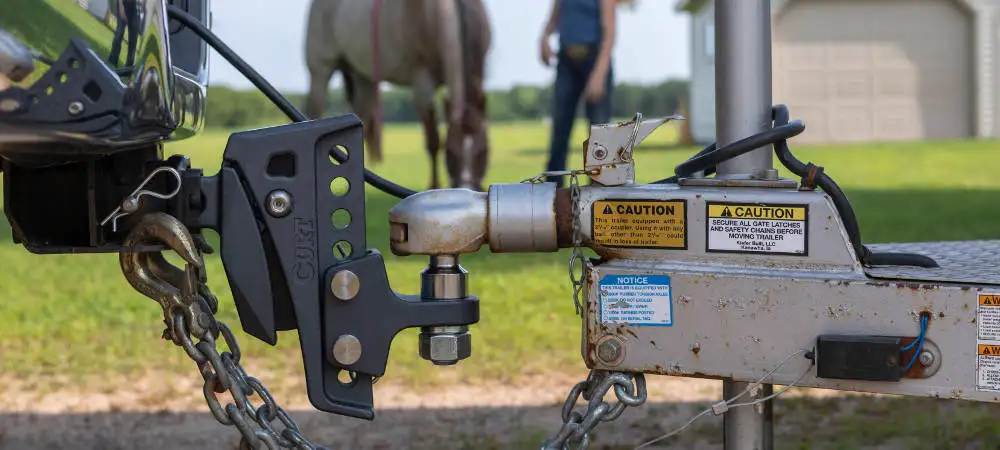
What to Consider When Choosing a Hitch
Picking a hitch isn't just about hooking up and going. You need to think about a few important factors to make sure you're towing safely and legally.
First, know your truck's Gross Vehicle Weight Rating (GVWR). This is how much your truck can safely weigh when it's fully loaded, including passengers, cargo, and the trailer tongue weight. You can usually find this in your owner's manual or on a sticker inside the driver's door frame. The GVWR is crucial because it determines the overall capacity of your vehicle for towing and hauling.
Speaking of tongue weight, that's the downward force the trailer puts on your hitch. It's usually about 10-15% of the total trailer weight. Too little or too much can make your trailer sway dangerously. Proper tongue weight distribution is essential for maintaining control of your vehicle and trailer while driving, especially at highway speeds or in windy conditions.
Your truck's towing capacity is crucial. This is the maximum weight your truck can tow safely. Don't forget to factor in the weight of passengers and cargo in your truck, as this reduces the available towing capacity. It's important to stay well within these limits to ensure safe and legal towing.
Lastly, make sure the hitch you choose is compatible with your specific truck model. Not all hitches fit all trucks, so double-check before you buy. Consider factors such as the frame design, rear bumper configuration, and any existing aftermarket modifications that might affect hitch installation.
Find the perfect interior accessories to complement your truck's towing setup and keep your cab organized while on the road.

Weight Distribution Hitches: What You Need to Know
Sometimes, you need a little extra help to keep things steady when you're towing. That's where weight distribution hitches come in. They're not just regular hitches – they're special systems that help spread the weight of your trailer more evenly across your truck.
Weight distribution hitches are great for improving stability and handling. If you've ever felt your truck's rear end sag under the weight of a trailer, or if the front wheels feel light, a weight distribution hitch can help fix that. It makes your whole setup more level and easier to control.
You might want to use a weight distribution hitch if you're towing a large travel trailer or if your trailer weighs more than half of your truck's weight. They're also good for long trips where you'll be on the highway a lot.
These hitches work by using spring bars to distribute the trailer's weight across all axles of the towing vehicle and trailer. This helps maintain proper steering and braking control, reduces sway, and improves overall towing performance. When properly set up, a weight distribution hitch can make a significant difference in how your truck handles while towing, especially in challenging conditions like crosswinds or when passing large vehicles.
Enhance your truck's performance with our suspension parts and accessories to complement your weight distribution hitch setup.
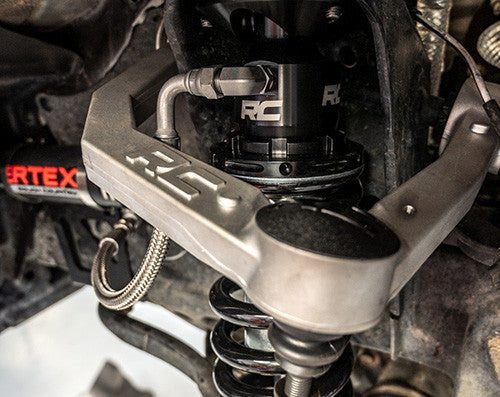
Popular Hitch Brands and What They Offer
When you're shopping for hitches, you'll see a few brand names pop up again and again. Let's look at some of the popular ones and what makes them stand out.
CURT is known for making a wide range of hitches for all kinds of vehicles. They offer everything from simple bike rack hitches to heavy-duty options for big trailers. CURT hitches are often praised for being easy to install and having a good fit. Their product line includes receiver hitches, 5th wheel hitches, and gooseneck hitches, as well as a variety of towing accessories.
Reese is another well-known brand. They make hitches for all sorts of towing needs, but they're especially known for their 5th wheel and gooseneck hitches. If you're doing some serious towing, Reese might have what you need. Their products are often favored by those who tow frequently or need to handle heavy loads.
B&W is a brand that specializes in heavy-duty hitches, particularly gooseneck and 5th wheel models. They're known for their innovative designs and high-quality construction. B&W hitches are popular among those who tow large RVs or commercial trailers.
Boost your truck's capabilities with our performance parts to get the most out of your towing setup.
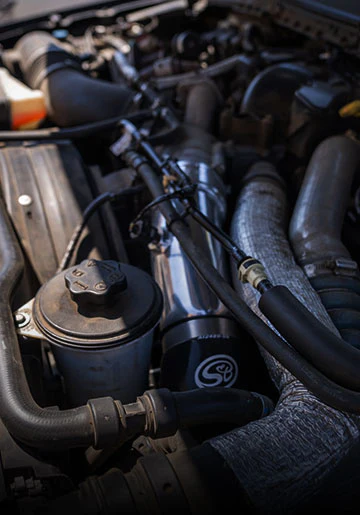
How to Pick the Right Hitch: Step by Step
Choosing a hitch doesn't have to be complicated. Here's a simple guide to help you pick the right one:
1. Figure out what you need to tow. Is it a small utility trailer, a boat, or a big RV? This will help you decide what type of hitch you need.
2. Check your truck's specs. Look up your vehicle's towing capacity and GVWR in the owner's manual or online.
3. Pick the right hitch class. Based on what you're towing and your truck's capacity, choose a hitch class that can handle the weight.
4. Think about extra features. Do you need a weight distribution system? What about sway control? Consider these add-ons for safer towing.
| Step | Action | Importance | Difficulty | Details | Status |
|---|---|---|---|---|---|
| 1 | Determine towing needs | High | Low | Identify what you need to tow (e.g., utility trailer, boat, RV) | Start Here |
| 2 | Check truck specifications | High | Medium | Look up vehicle's towing capacity and GVWR in owner's manual or online | Next Step |
| 3 | Select hitch class | High | Medium | Choose a hitch class based on towing needs and truck's capacity | Important |
| 4 | Consider additional features | Medium | Medium | Evaluate need for weight distribution system or sway control | Optional |
Installing Your Hitch: DIY or Pro?
Once you've picked your hitch, you need to decide if you're going to install it yourself or have a pro do it. Here's what to think about:
If you're handy with tools and comfortable working on your truck, you might be able to install a simple receiver hitch yourself. You'll need some basic tools like wrenches, a torque wrench, and maybe a drill. Always follow the instructions carefully and don't skip any steps. DIY installation can save you money, but it's crucial to ensure you have the right tools and knowledge to do the job correctly.
For more complex hitches like 5th wheel or gooseneck hitches, or if you're not sure about doing it yourself, it's best to have a professional install it. They have the right tools and know-how to make sure everything is installed correctly and safely. Professional installation ensures that the hitch is properly aligned and secured, which is critical for safe towing.
No matter who installs it, safety is key. Make sure all bolts are tightened to the right torque, and that everything is secure before you start towing. After installation, it's a good idea to have the hitch inspected regularly, especially before long trips or if you notice any changes in your towing performance.
Prepare for any towing situation with our winch and recovery equipment to keep you safe on and off the road.
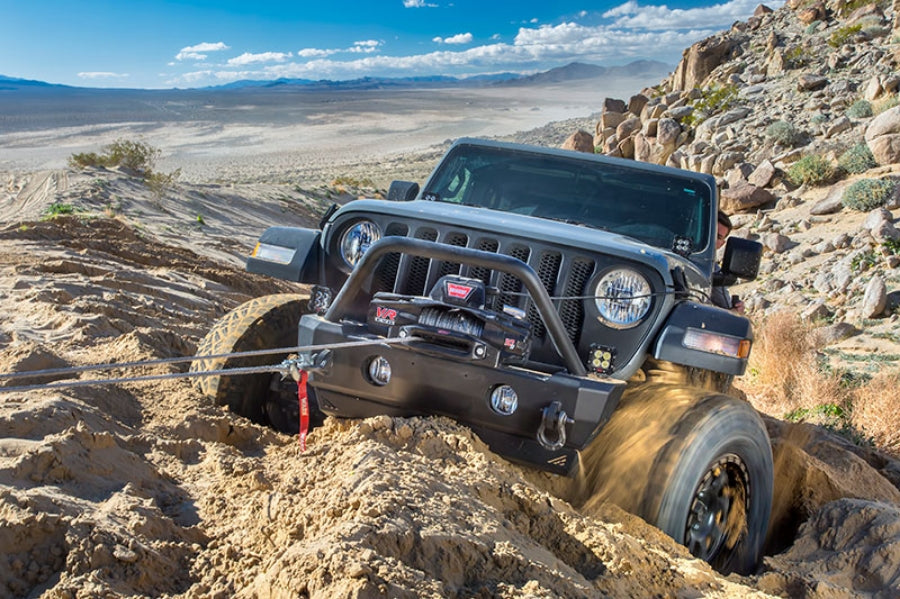
Hitch Accessories You Might Need
Your hitch is just the start. There are a few accessories you might need to complete your towing setup:
Ball mounts are what you attach your trailer ball to. They come in different rises and drops to make sure your trailer is level with your truck. Choosing the right ball mount is crucial for proper weight distribution and to ensure your trailer rides level.
Trailer balls come in different sizes to match your trailer's coupler. Make sure you get the right size for what you're towing. Common sizes include 1 7/8", 2", and 2 5/16". Using the correct size is essential for a secure connection between your vehicle and trailer.
Wiring harnesses connect your truck's lights to your trailer's lights. This is important for safety and is required by law. A proper wiring harness ensures that your trailer's brake lights, turn signals, and running lights function correctly.
If you're towing a heavier trailer, you might need an Integrated Trailer Brake Controller (ITBC). This helps you control the trailer's brakes from inside your truck. An ITBC can significantly improve your stopping power and control when towing heavy loads.
Other useful accessories might include hitch locks to prevent theft, hitch covers to protect the receiver when not in use, and trailer hitch alignment systems to make hooking up easier.
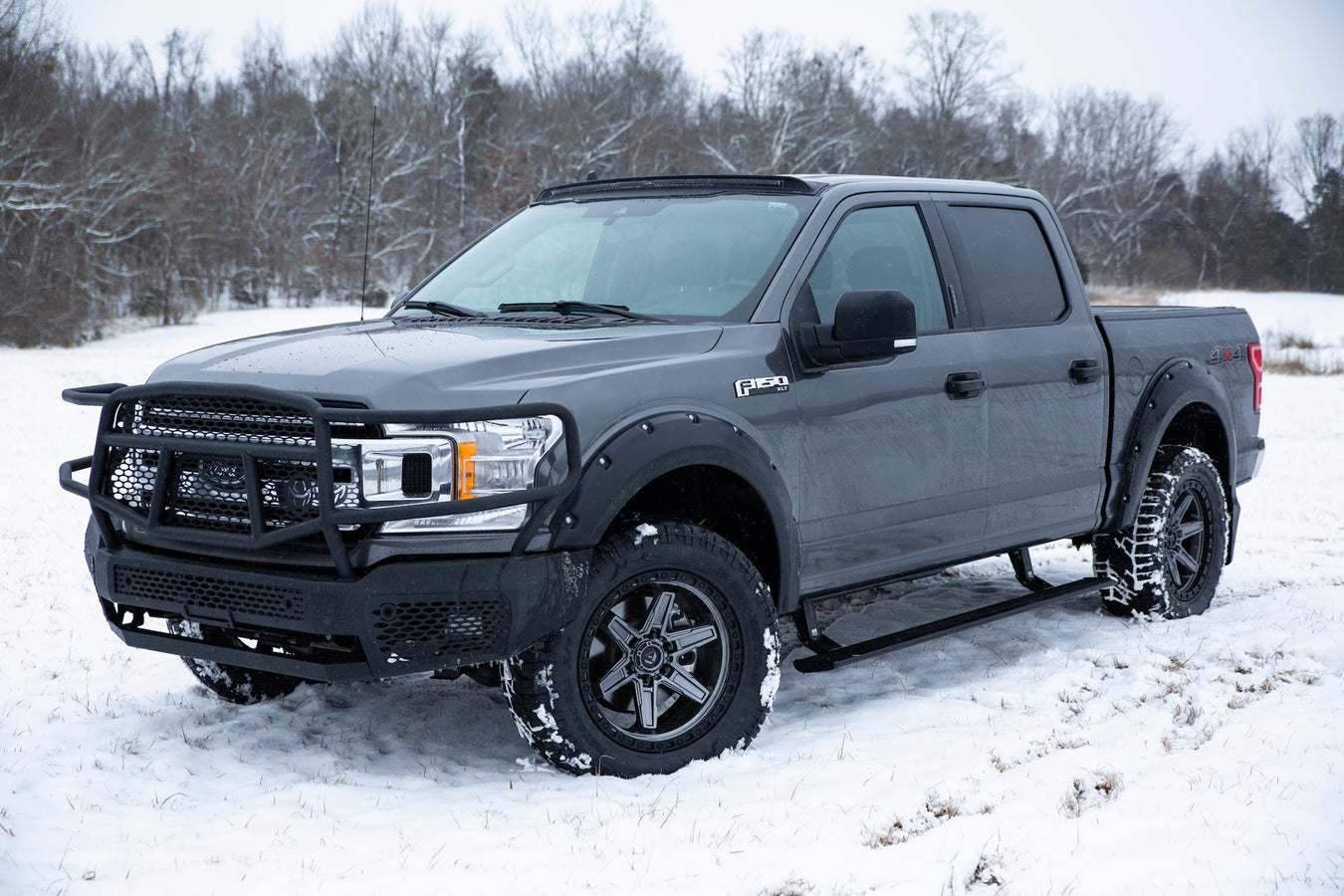
Staying Safe While Towing
Towing safely is about more than just having the right equipment. Here are some tips to keep in mind:
Check your hitch and all connections before every trip. Look for wear and tear, and make sure everything is tight and secure. This includes checking the ball mount, trailer ball, safety chains, and wiring connections.
Load your trailer properly. Put heavier items over the trailer axles and distribute weight evenly. This helps prevent swaying and improves stability. Avoid overloading the front or rear of the trailer, as this can affect handling and braking.
Know the towing laws in your area. These can include speed limits for towing, required safety equipment, and how wide or long your setup can be. Towing laws can vary by state or province, so research the regulations for areas you'll be traveling through.
Practice driving with your trailer in a safe area before hitting the road. Get used to how it feels, especially when turning and backing up. Remember that towing affects your vehicle's acceleration, braking, and turning radius.
Maintain proper tire pressure on both your truck and trailer. Underinflated tires can lead to poor handling and increased risk of blowouts. Check tire pressure before each trip and inspect tires for wear or damage.
Use your mirrors and be aware of your increased length and width when towing. Allow for extra space when changing lanes or merging, and increase your following distance to give yourself more time to stop.
Protect your truck and cargo with our range of exterior accessories designed to keep your vehicle safe during towing.

Wrapping Up: Making Your Hitch Decision
Choosing the right hitch for your truck is all about knowing what you need and understanding your vehicle's capabilities. Remember these key points:
- Match the hitch type and class to what you're towing and your truck's capacity. - Consider weight distribution and sway control for safer towing. - Don't forget about accessories like ball mounts and wiring harnesses. - Always prioritize safety, from installation to your towing practices.
Take your time to research and don't hesitate to ask questions. Your truck's manual is a great resource, and talking to professionals can give you valuable insights. With the right hitch, you'll be ready to tow safely and confidently, no matter where the road takes you.
"Choosing the right hitch is about balancing your needs with your truck's capabilities. Prioritize safety, match the hitch to your towing requirements, and don't overlook essential accessories. With careful consideration and the right information, you'll be ready to tow confidently and securely."
